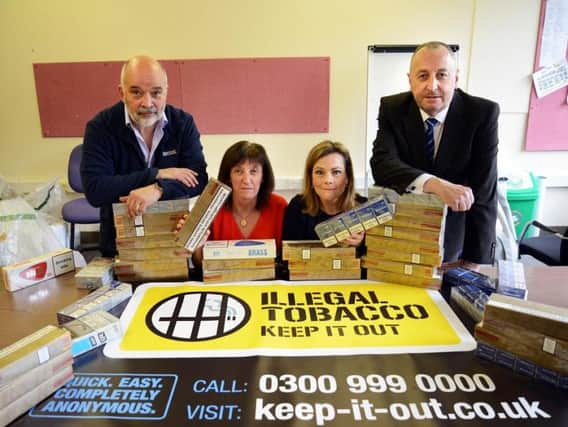Illegal tobacco bought by more than half of teenage smokers in Northumberland


Fifty-five per cent of children aged 14 and 15 who smoke say they buy illegal tobacco from sources like 'tab houses' and shops, while 73 per cent say they have been offered illegal tobacco.
The figures, from the 2017 North East Illegal Tobacco Survey, are released as Fresh launches the new Keep It Out campaign aimed at helping the public to spot illegal tobacco,
report it and to encourage smokers not to buy it.
Advertisement
Hide AdAdvertisement
Hide AdAs well as helping children to start smoking, people supplying illegal tobacco are often involved in drugs or loan sharking. Buying it means supporting crime and can bring children into contact with criminals.
Ailsa Rutter, director of Fresh, said: "One in two smokers will die from their addiction and no one wants their child to start. While fewer people than ever are now smoking, illegal cigarettes are often responsible for getting children initiated on smoking as they can buy it at pocket money prices from people who don';t care who they sell to."
Northumberland County Councillor Veronica Jones, cabinet member for adult wellbeing and health, said: "We are happy to support the Keep It Out campaign. Children and young smokers are often targeted by people who sell illegal cigarettes, making it even easier for them to become hooked on smoking. The availability of illegal cigarettes also makes it harder for people to quit and remain smoke-free. For anyone thinking of, or in the process of quitting, help is on hand with support available from the Northumberland Stop Smoking Service."
Northumberland County Council’s interim director of public health, Liz Morgan, said: "Smoking kills one in two long term users and illicit tobacco keeps smokers hooked and encourages children to start smoking at a young age. The Northumberland Stop Smoking Service provides advice, support and encouragement to stop smoking for good. With expert help from the stop smoking service you are four times more likely to succeed than those who try to quit without support."
Advertisement
Hide AdAdvertisement
Hide AdCoun John Riddle, Northumberland County Council’s cabinet member for planning, housing and resilience, said: "The illicit trade of tobacco brings crime into local communities. Young and vulnerable people are often the ones to visit private addresses to buy cigarettes, exposing them to people who might also be selling alcohol, drugs and stolen goods. Trading Standards have a vital role in tackling the trade of illicit tobacco and in Northumberland we are ready to take enforcement action on intelligence."
Anyone with information about houses, shops, pubs or individuals selling illegal tobacco can give information online at www.keep-it-out.co.uk or by calling the illegal tobacco hotline at
0300 999 00 00. All information will be treated anonymously.
The survey of more than 3,000 people from across the North East, which has tracked the size of the illegal tobacco market since 2009 and attitudes towards it, has found in 2017:
Advertisement
Hide AdAdvertisement
Hide AdIllicit makes up 12 per cent of all tobacco smoked - a smaller proportion than in 2009 (16 per cent), but slightly higher than in 2015 ( nine per cent);
Less than one in five (18 per cent) of smokers buy illicit – a reduction from 24 per cent in 2009;
The proportion of smokers who have tried illicit tobacco has decreased from 46 per cent in 2011 to 37 per cent in 2017;
Those smokers who do buy illegal tobacco are buying more of it - it makes up 58 per cent of their overall tobacco compared to 40 per cent in 2013;
Advertisement
Hide AdAdvertisement
Hide AdPrivate addresses are the leading source (42 per cent) followed by shops (24 per cent);
Less is now being bought in pubs, but pubs are still the place where smokers are most likely to be offered it by hawkers touting it around.